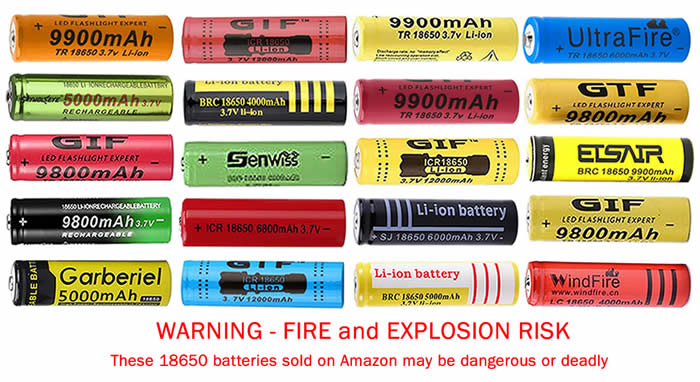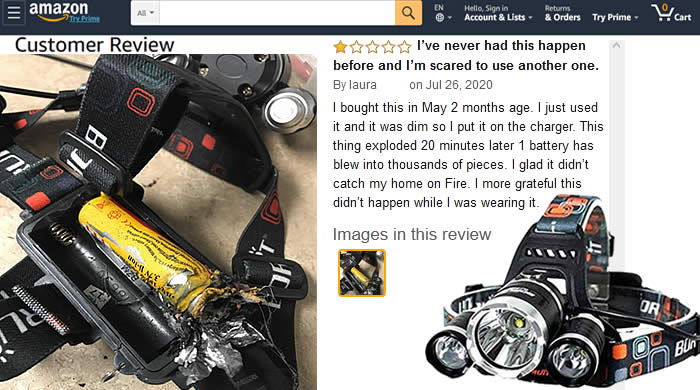Federal Class-Action Lawsuit Exposes Amazon Fraudulent Products
Sales of dangerous and potentially deadly fraudulent products continue after legal notice.
August 17, 2021, Los Angeles, CA – After repeatedly ignoring the opportunity to avoid a dangerous and potentially deadly situation, Amazon is again the target of a significant class-action lawsuit in U.S. District Court (Crosby/Johnson v. Amazon.com Inc) for misleading consumers and the direct and repeated sales of fraudulent and potentially deadly products.
The lawsuit arose when Amazon chose to ignore two legal notices, a similar federal lawsuit filed in California Federal Court in September 2020, and hundreds of complaints submitted for hundreds-of-thousands of dangerous, fraudulent Lithium-ion ("Li-ion") battery cells offered or sold on Amazon. Amazon chose to block negative feedback and complaints about the dangerous products but continued the sales. What makes this even more shocking is that Amazon's policy prohibits the sale of ALL individual Li-ion cells. Despite its stated policy and common sense, Amazon is often the direct seller and also facilitates third-party sales of hundreds of thousands of the dangerous and potentially deadly items.
Plaintiff's Craig Crosby, the publisher of The Counterfeit Report, and Christopher Johnson, a retired Assistant United States Attorney, took the decisive federal court action to prevent more people from being injured or killed by the dangerous products and put a stop to Amazon's ongoing nefarious activities. The swiftest way to hold Amazon accountable is by hitting them in the area they most care about -- their pocketbook. Consumers should not be deceived into spending good money on harmful products that can injure and kill them while Amazon profits, says Crosby.
Alarmingly, this is the second lawsuit Amazon faces for deceptive battery sales. Amazon directed its efforts to dispute a similar federal class-action case in California for over a year. Amazon moved the California Court to compel individual arbitrations in Washington and stay litigation, arguing, among other things, that plaintiffs agreed to arbitration per its conditions of use (“COUs”) when they registered their accounts. Amazon continued the product sales during the dispute.
But, Amazon's strategy backfired. In May, Amazon attempted to quietly drop the arbitration clause in its contract after plaintiff's lawyers in another case sued Amazon. Amazon again sheltered behind the arbitration clause, but law firm Keller Lenkner and other plaintiff's lawyers flooded Amazon with tens of thousands of individual demands for arbitration. The action left Amazon on the hook for tens of millions of dollars of individual arbitration filing and administration fees Amazon agreed to in its user contracts, in addition to damage awards. “Companies thought they were getting out of liability altogether” by adding arbitration clauses, said Chicago lawyer Travis Lenkner in a WSJ interview, whose firm filed the majority of the Amazon claims. “Now they’re seeing exactly what they bargained for, and they don’t like it.”
Case background:
Lithium-ion 18650 battery cells (usually called batteries) are a widespread and common power source used in most battery packs for laptops, cameras, power tools, toys, and hoverboards, and individually in flashlights, e-cigarette, and vape devices. Seven thousand individual 18650 cells power a Tesla automobile. All individual 18650 Li-ion battery cells with a stated capacity of 3800mAh (milliamp hours) or above are fraudulent. Yet, hundreds of thousands have been listed on Amazon, some with wild capacity claims up to 12,000mAh.
Unscrupulous China salvagers re-label the recycled used 18650 battery cells reselling them online as "new" with wild capacity claims individually and in battery packs at low prices. Overheating and fires turn unprotected individual 18650 cells into exploding bombs with dangerous or deadly consequences for consumers. Few consumers understand that the individual 18650 cells rarely have the capacity, built-in protective circuitry, or the venting claimed, which would protect against overcharging, overheating, fires, explosions, or other harmful events.

For example, this Amazon-listed flashlight headlamp includes a glaring consumer warning, "I just used it and it was dim so I put it on the charger. This thing exploded 20 minutes later 1 battery has blew into thousands of pieces. I glad it didn't catch my home on Fire. I more grateful this didn't happen while I was wearing it."

Thousands of hospital emergency room visits, hundreds of aircraft fires, dismemberments, hospitalizations, and deaths are documented from Li-ion batteries;
Amazon, under an umbrella of legal immunity, provides its unique platform for unregulated sales of dangerous products, leaving consumers on their own to sort the legitimate, honest sellers from all the bad actors. Amazon allows fraudsters to voraciously churn counterfeit, replica, and fraudulent items, indifferent to the damage they cause to consumers, legitimate sellers, and manufacturers while fulfilling their desire to be the sole source of items for purchase. Consumers are left to fend for themselves.
In the latest in a series of Amazon lawsuits for counterfeit, fraudulent, and dangerous products, Amazon has some explaining to do.
Plaintiffs are represented by Niall P. McCarthy and Karin B. Swope of Cotchett, Pitre, & McCarthy, LLP, Burlingame, CA. (650) 697-6000. The case is titled Craig Crosby and Christopher Johnson v. Amazon.com, Inc. Case No. 2:21-cv-01083 Additional information about the case against Amazon is available by contacting Karin B. Swope. contact the firm
 |